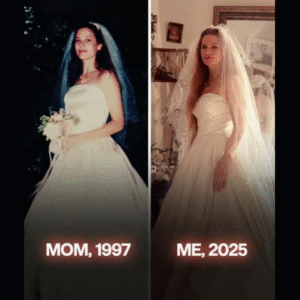The Dress, the Betrayal, and the Lesson That Echoed Through Our Family
My mother died when I was twelve. She was grace wrapped in laughter, the kind of woman who made strangers feel like old friends. Her wedding dress—ivory satin, hand-stitched lace, a row of tiny pearl buttons down the back—was the one thing she asked to be preserved. Not for display. Not for nostalgia.
But for me.
She wanted me to wear it on my wedding day.
And I did too.
I kept it sealed in a garment bag, tucked in the back of my closet. I’d unzip it sometimes, just to run my fingers over the lace. It smelled faintly of lavender and hope. It was my connection to her. My promise to her.
Then my father remarried.
Her name was Diane. She was polished, opinionated, and had a habit of rearranging things that weren’t hers. I tried to be polite. I tried to be open. But something about her always felt… performative. Like she was playing the role of “wife” and “mother” without understanding the weight those titles carried.
Still, I never imagined she’d touch the dress.
Until she did.
🧠 The Discovery That Broke Me
I came home from college for spring break. My room had been “updated”—Diane’s word. New curtains. New bedding. My books boxed up. My closet reorganized.
And the dress?
Gone.
I tore through the house. I asked her directly. She didn’t flinch.
“Oh, that old thing?” she said. “It was yellowing. Outdated. I donated it.”
I couldn’t speak. I couldn’t breathe.
She saw my face and shrugged. “You’ll want something modern anyway. That dress was depressing.”
I locked myself in the bathroom and sobbed until my ribs hurt.
🔥 The Moment My Father Stepped In
I didn’t tell my father right away. I didn’t want to cause a fight. But he noticed. He always did.
That night, he knocked on my door. “You’ve been quiet,” he said.
I told him everything.
He didn’t say a word. Just sat there, jaw clenched, eyes dark.
The next morning, Diane was gone.
Not permanently. But for the weekend.
My father had booked her a spa retreat. “You deserve a break,” he told her.
And while she was gone, he got to work.
He called the donation center. He tracked the dress. He found it—stuffed in a bin, tagged for resale. He drove three hours to retrieve it.
But it was ruined.
The lace torn. The buttons missing. The scent of lavender replaced by mildew.
He brought it home anyway.
And then he did something I’ll never forget.
He framed it.
Not the whole dress. Just a piece of the lace. A single pearl button. And a photo of my mother wearing it on her wedding day.
He hung it in the hallway.
Right outside Diane’s bedroom.
🧵 The Confrontation
When Diane returned, she saw it immediately.
“What is that?” she asked.
My father looked her in the eye. “That,” he said, “is what you threw away.”
She sputtered. “It was just a dress.”
“No,” he said. “It was a promise. And you broke it.”
She tried to argue. He didn’t let her.
“You don’t get to decide what grief looks like. You don’t get to erase memories that aren’t yours. And you don’t get to touch what was sacred to my daughter.”
She didn’t speak to either of us for days.
And honestly?
That was fine.
🌿 The Healing That Followed
The framed piece of the dress became a symbol. Not of loss. But of resilience. Of boundaries. Of the quiet strength my father carried.
He wasn’t loud. He wasn’t cruel.
He was deliberate.
And that taught me something.
That justice doesn’t always roar.
Sometimes, it hangs quietly on a wall.
And waits.
🕊️ The Wedding Day
When I got engaged, I didn’t have the dress.
But I had the lace.
I had the button.
I had the photo.
And I had my father.
He walked me down the aisle with the framed piece tucked under his arm. He placed it on the altar. And when I said my vows, I looked at it.
And I felt her.
Not in the fabric.
But in the love.
💡 What We Learn
From this story, we learn that grief is sacred. That memory is not disposable. That some things—like a wedding dress—carry more than stitches. They carry stories.
We learn that betrayal doesn’t always come from enemies. Sometimes, it comes from people who claim to love us—but don’t understand us.
We learn that justice doesn’t need revenge.
It needs clarity.
And we learn that fathers, even in silence, can be warriors.
Not with fists.
But with love.



